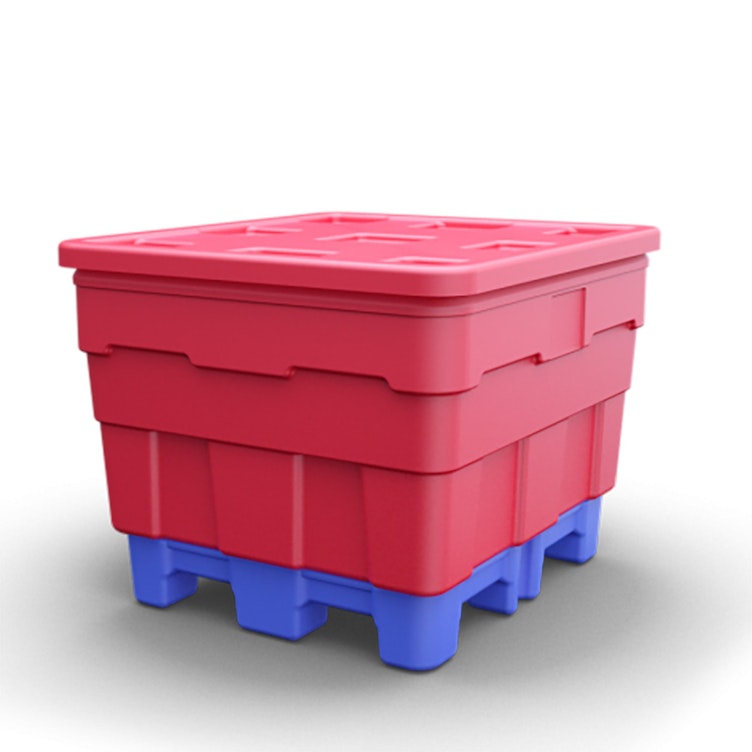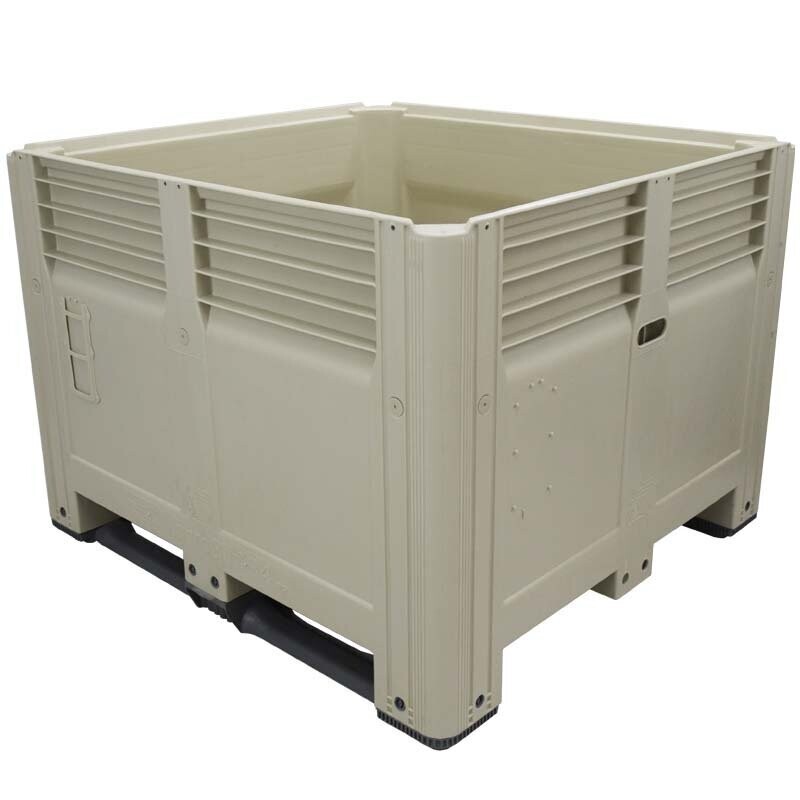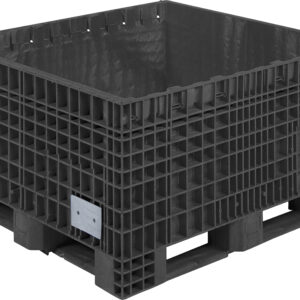The Duty of Mass Plastic Containers in Effective Recycling Practices and Sustainability
Bulk plastic containers are indispensable to contemporary reusing efforts. Their style improves the efficiency of material collection and transportation, adding to sustainability goals. These containers not just optimize room yet also assist in checking contamination degrees. However, their execution is not without difficulties. Recognizing the full range of their impact discloses a complex relationship in between logistics and ecological responsibility that necessitates additional exploration.
Understanding Mass Plastic Containers
Bulk plastic containers act as an important element in different sectors, assisting in the storage space and transportation of goods. These containers are normally made from durable products such as high-density polyethylene (HDPE) or polypropylene, which provide toughness and resistance to environmental elements. Their style usually includes attributes like stackability and modularity, permitting efficient usage of area throughout both storage space and transit.
Industries such as farming, food handling, and manufacturing often utilize bulk plastic containers as a result of their lightweight nature and ease of handling. The containers are available in different dimensions and arrangements, satisfying the certain requirements of various items. Their convenience prolongs past plain performance; they can also be tailored with covers, handles, and identifying choices to boost functionality - bulk plastic containers for sale. As a result, bulk plastic containers play a vital function in maximizing logistics and supply chain operations throughout multiple sectors, thereby contributing to total efficiency and cost-effectiveness
Benefits of Utilizing Bulk Plastic Containers in Recycling
When organizations focus on reusing initiatives, the application of bulk plastic containers greatly improves the effectiveness of the procedure. These containers are made to enhance space, permitting the storage space and transportation of larger quantities of recyclable materials. This leads to fewer trips to recycling centers, thus reducing fuel usage and connected discharges.
In addition, bulk plastic containers are resistant and durable to numerous environmental elements, guaranteeing that materials continue to be secured throughout handling and transit. Their lightweight design additionally contributes to lower transportation costs.
Moreover, the harmony of these containers facilitates better sorting and processing of recyclable materials, which can enhance general recycling prices - bulk plastic containers for sale. Organizations that embrace bulk plastic containers also demonstrate a commitment to sustainability, positively affecting their brand image. Eventually, these advantages not only improve reusing techniques yet likewise add to broader ecological objectives
Just How Mass Plastic Containers Facilitate Material Collection
Reliable material collection is considerably improved by the usage of mass plastic containers, as they supply a efficient and structured solution for collecting recyclable things. These containers are developed to fit large volumes of products, which streamlines the sorting and storage space process. Their stackable style makes the most of area usage, making it much easier for centers to arrange recyclables without clutter.
Furthermore, mass plastic containers are weather-resistant and long lasting, enabling for exterior placement without destruction. This strength assures that products continue to be safeguarded up until they are accumulated for processing.

The uniformity in size and form of these containers facilitates standardization throughout collection factors, making it possible for better tracking of recyclable quantities. Their clear nature allows for easy visibility of materials, aiding in the tracking of contamination degrees and ensuring that only proper products are gathered. Overall, mass plastic containers play a critical function in improving the product collection process, thereby advertising efficient recycling practices.
Transport Performance and Environmental Effect
Transportation efficiency plays an important role in the reusing process, especially with the optimization of tons capacity wholesale plastic containers. By maximizing the quantity of product transferred, firms can greatly decrease the number of journeys required, therefore decreasing their carbon impact. This method not just enhances operational efficiency however also adds to much more lasting ecological techniques.

Optimizing Tons Ability
Optimizing lots capacity is typically overlooked, it plays a vital role in improving transportation effectiveness and reducing environmental impact in recycling methods. By optimizing the quantity that mass plastic containers can hold, recycling operations can decrease the variety of journeys needed for transport. This not only decreases fuel consumption but additionally lowers the deterioration on vehicles. Effective tons monitoring allows centers to make use of room effectively, making certain that each transport cycle is as efficient as feasible. Additionally, well-optimized lots can lead to far better settlements with logistics providers, possibly decreasing overall costs. Eventually, boosting tons capacity adds to a much more sustainable recycling system by cultivating effective source usage and lessening waste created throughout transportation.
Lowering Carbon Impact
As reusing operations undertaking to lessen their environmental influence, reducing the carbon footprint linked with transportation emerges as a vital goal. Bulk plastic containers play a vital duty in achieving this goal by enhancing lots performance and optimizing logistics. Their light-weight yet durable style permits optimum cargo room utilization, decreasing the number of journeys needed to deliver products. By settling deliveries, reusing facilities can lower fuel consumption and greenhouse gas emissions. On top of that, purposefully finding recycling centers decreases transport ranges, furthermore reducing carbon outcomes. Using fuel-efficient cars and alternate power resources boosts overall sustainability. By integrating these techniques, the reusing sector can appreciably reduce its carbon impact, contributing to a much more sustainable future.
Difficulties in using Mass Plastic Containers

Contamination Issues
Contamination issues stand for a substantial obstacle in the reliable usage of mass plastic containers within recycling practices. These containers commonly gather deposits from previous materials, bring about blended products that can impede the reusing procedure. Pollutants such as food waste, chemicals, or non-recyclable products can jeopardize the honesty of the whole set, causing raised disposal costs and reduced reusing rates. In addition, improper cleaning or sorting can worsen these issues, making it challenging for reusing centers to refine materials efficiently. The presence of pollutants not only affects the top quality of recycled items yet likewise threatens the overall sustainability initiatives aimed at minimizing plastic waste. Attending to these contamination difficulties is crucial for boosting the effectiveness of mass plastic container recycling.
Recycling Infrastructure Limitations
Inadequacy in recycling facilities presents considerable obstacles for the effective management of mass plastic containers. Numerous recycling facilities lack the ability to process huge quantities of these containers successfully, leading to boosted costs and hold-ups. Insufficient arranging technologies typically lead to contamination, as bulk containers might be blended with various other materials, complicating the reusing procedure. Limited transportation choices additionally hinder the activity of mass plastic containers to ideal reusing facilities, resulting in raised landfill waste. Additionally, a lack of standard methods for mass container recycling produces confusion amongst companies and consumers, further complicating initiatives to promote sustainability. Dealing with these infrastructure constraints is crucial to improve recycling techniques and make best use of the capacity of mass plastic containers in a circular economy.
Best Practices for Executing Mass Plastic Containers
They ought to prioritize a critical technique that improves efficiency and lowers contamination risks when organizations take into consideration applying bulk plastic containers in their reusing practices. Initially, picking the proper container size and type is necessary to fit the quantity of products being processed. Organizations should additionally establish clear labeling and signage to assist individuals on appropriate disposal techniques, minimizing complication and errors. Regular training sessions for staff can additionally strengthen these practices, making certain everybody recognizes their roles in maintaining recycling integrity.
In addition, companies ought to carry out a routine upkeep timetable to check and clean containers, avoiding the accumulation of contaminants. Partnering with local reusing centers can additionally streamline the collection procedure, ensuring that products are properly refined. here Finally, organizations must keep track of and evaluate their recycling metrics, using this information to refine practices gradually and promote continual enhancement in their sustainability efforts.
The Future of Bulk Plastic Containers in Sustainable Practices
As organizations progressively prioritize sustainability, the role of bulk plastic containers in recycling techniques is established to progress significantly. Advancements in materials scientific research are causing the advancement of eco-friendly and recyclable options, improving the ecological advantages of bulk plastic containers. Furthermore, the application of closed-loop systems will enable much easier collection and repurposing of these containers, minimizing waste and resource intake.
Technical improvements, such as wise tracking systems, will certainly make it possible for business to keep track of the lifecycle of mass containers, boosting efficiency in recycling processes. As consumer demand for Get More Information lasting methods expands, businesses will likely adopt bulk plastic containers designed for reuse and long-lasting value. Moreover, cooperation in between governments and industries will certainly foster the establishment of standardized recycling procedures, making certain that mass containers are effectively incorporated into more comprehensive sustainability campaigns. On the whole, the future of mass plastic containers appears encouraging, with considerable potential for adding to a round economic situation.
Often Asked Concerns
Exactly How Are Bulk Plastic Containers Made and What Materials Are Made use of?
Bulk plastic containers are usually made from high-density polyethylene (HDPE) or polypropylene (PP) These products are processed via shot molding or impact molding methods, causing sturdy, light-weight containers appropriate for various storage and transport needs.
Can Bulk Plastic Containers Be Recycled Several Times Prior To Recycling?
Yes, bulk plastic containers can be recycled several times before recycling. Their sturdiness and layout permit duplicated use in various applications, advertising sustainability and source efficiency while decreasing the requirement for new containers.

What Accreditations Exist for Mass Plastic Containers in Recycling?
Various certifications for mass plastic containers include the Recycling Partnership's qualification, the Cradle to Cradle Licensed ™ standard, and the Lasting Product packaging Union's guidelines, making certain containers fulfill particular ecological and recyclability criteria for efficient recycling.
How Do Mass Plastic Containers Compare to Various Other Recycling Storage Options?
Bulk plastic containers supply higher sturdiness and capacity contrasted to other recycling storage space options, reducing the threat of contamination and helping with reliable transport. Their layout supports much better company, enhancing general effectiveness in reusing operations.
What Is the Life expectancy of a Bulk Plastic Container in Recycling Processes?
The life-span of a bulk plastic container in reusing procedures normally ranges from 5 to 10 years, depending upon use, material top quality, and environmental problems, allowing for numerous cycles of use before eventual disposal or recycling.
When companies prioritize reusing efforts, the application of mass plastic containers substantially enhances the effectiveness of the procedure. Transportation performance plays a necessary duty in the reusing procedure, specifically via the optimization of load capability in bulk plastic containers. The usage of mass plastic containers in recycling methods encounters considerable challenges, especially concerning contamination concerns and restrictions within reusing framework. Contamination issues stand for a considerable obstacle in the reliable usage of mass plastic containers within recycling practices. When organizations take into consideration executing bulk plastic containers in their recycling practices, they ought to prioritize a calculated strategy that boosts efficiency and minimizes contamination threats.